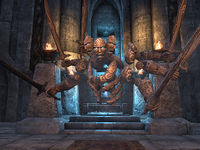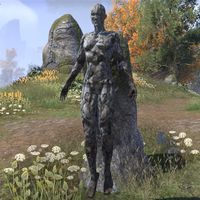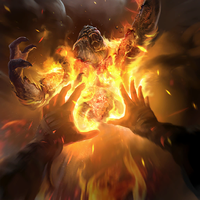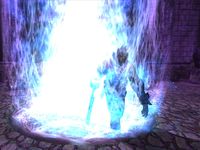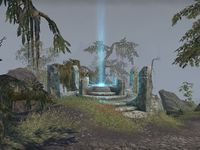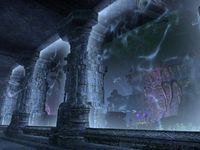Lore:Elements
Contents
The elements are the basic constituents of Nirn. The ancient Ayleids believed Nirn was composed of four elements: Earth, Water, Air, and Light.[1] The element of Fire was not recognized by their culture, although modern mages consider Fire to be one of the five elements of creation.[2][3][4] Practitioners of Flesh Magic believe that Flesh is the sixth element.[3]
Air[edit]
Air (known as Su in the Dragon language)[5] is one of the basic elements of creation. Air Atronachs are a type of Elemental Daedra formed from pure air. They are believed to possess the combined powers of Flame Atronachs, Frost Atronachs, and Storm Atronachs.[6]
In Tsaesci culture, Ilni represents the Air element.[7] Unala-Se is a Magna Ge associated with Air.[8] The Beldama Wyrd worship a trapped Ehlnofey known as the Guardian of the Air, an ancient being that represents the element in its true form.[9]
Earth[edit]
Earth (known as Gol in the Dragon language)[10] is one of the basic elements of creation.
In Tsaesci culture, Nyfa represents the Earth element.[7] Londa-Vera is a Magna Ge associated with Earth.[8] The Beldama Wyrd worship a trapped Ehlnofey known as the Guardian of the Earth, an ancient being that represents the element in its true form.[11]
Fire[edit]
Fire (known as Yol in the Dragon language)[12] is the fifth element of creation. It was not recognized by the ancient Ayleids, who preferred to associate it with the element of Light.[1] Practitioners of the School of Destruction utilize elemental fire magic to create offensive spells.[13] Certain fires have been known to possess magical connections to Aetherius, such as the Dragonfires,[14] the Direfrost Flame,[15] and the Flame of the Harbinger.[16]
In Tsaesci culture, Myn represents the Fire element.[7] In certain island cultures, Arius is known as the God of Fire.[17] Valia-Sha is a Magna Ge associated with Fire.[8] The Pandrum Clan of Orcs (also known as the Fire Clan) supposedly wielded fire as both a weapon and as a tool for a variety of uses. They are rumored to consist of primitive shamans and healers. They disappeared into obscurity during the second siege of Orsinium.[18]
Flesh[edit]
|
Unlike the other five elements, the sixth element of Flesh (known as Slen in the Dragon language)[19] is said to have been "hidden" at creation by virtue of its own self-awareness. It remains largely unknown and esoteric among modern societies. The element is formed by binding the Essence of Flesh with the Quintessence of Flesh. The Essence is formed from an amalgamation of Meat, Blood, Bone, and Breath—the essential components of true Flesh. Through many years of intensive labor, these four essential components can be isolated and grown into their mystical forms: Osseous Marrow, Dermis Membrane, Essence of Breath, and Blood Liqueur. The Quintessence of Flesh is the immortal Soul, usually represented in Flesh Magic rituals in the form of a bound Daedric vestige.[3]
Xero-Lyg is a Magna Ge associated with Flesh.[20]
Light[edit]
|
Light (also called Aether[2] and Jun in the Dragon language)[21] is one of the basic elements of creation. It was the most exalted of the four elements recognized by the Ayleids. They believed the most sublime form of light was starlight due to it emanating from the plane of Aetherius, the source of all magical power. The belief that starlight is the most potent of all magical powers led the Ayleids to utilize Aetherial fragments in their magical practice. This resulted in the creation of Welkynd Stones, Varla Stones, and Ayleid Wells, among other such artifacts associated with starlight.[1]
Water[edit]
Water (known as Laar in the Dragon language)[22] is one of the basic elements of creation. On Tamriel, water is composed of memory. When a mortal dies, their memories become water, and in this way all the memories of Tamriel's histories are stored within its waters. This fact is considered to be one of the most dangerous secrets about the natural order of the world, and is therefore closely guarded by the Demon of Knowledge Hermaeus Mora.[23] Many cultures utilize some form of Water Magic to manipulate this element.[24]
In Tsaesci culture, Zisa represents the Water element.[7] Sheza-Rana is a Magna Ge associated with Water.[8] The Beldama Wyrd worship a trapped Ehlnofey known as the Guardian of the Water, an ancient being that represents the element in its true form.[25]
Notes[edit]
- Although referred to as elemental spells by the School of Destruction, ice, lightning, disease, poison, and Oblivion are not considered to be basic elements.
- Similarly, iron, shadow, stone, and cold-flame are referred to as elements in the context of Elemental Daedra.
See Also[edit]
- Elemental Daedra — Atronachs that embody certain elements
References[edit]
- ^ a b c Magic from the Sky — Irlav Jarol
- ^ a b Thoughts on the Sacred Numbers
- ^ a b c Relmyna Verenim's dialogue in Oblivion: Shivering Isles
- ^ Application of Flame — Graguz, Master of the Fire Elements
- ^ Elemental Fury in Skyrim
- ^ Nomeg Ozal's dialogue in ESO
- ^ a b c d Tale of the Elements — Nalae-Polek, Poet Laureate to Potentate Versidue-Shaie
- ^ a b c d The Nine Coruscations, Volume I — Star-Queen Varalias
- ^ Guardian of the Air in ESO
- ^ Bend Will in Skyrim: Dragonborn
- ^ Guardian of the Earth in ESO
- ^ Fire Breath in Skyrim
- ^ Destruction magic in Morrowind
- ^ Trials of St. Alessia
- ^ The Direfrost Flame — Thorvild Direfrost
- ^ Events of Glory of the Dead in Skyrim
- ^ Arena's Generate Class option in the character creation menu
- ^ Orc Clans and Symbology — Kraltha the Rememberer
- ^ Ice Form in Skyrim
- ^ The Nine Coruscations, Volume II — Star-Queen Varalias
- ^ Paarthurnax's dialogue in Skyrim
- ^ Official Bethesda Dragon dictionary from Imperial Library
- ^ Herald Kixathi's dialogue in ESO
- ^ Lakemire Xanmeer Manor in ESO
- ^ Guardian of the Water in ESO
|
||||||||||||||||||||||
